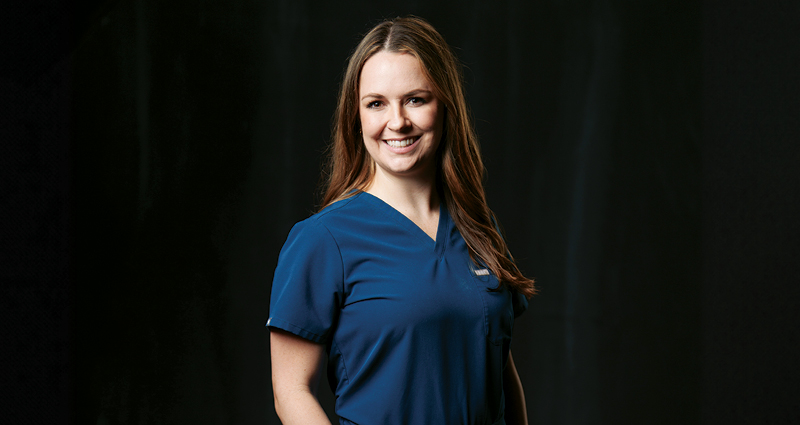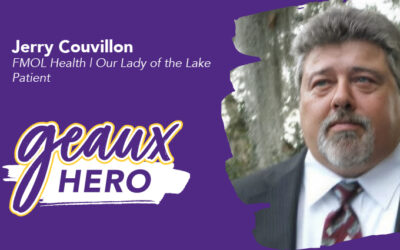When battling cancer, the importance of proper nutrition can’t be overstated.
As cancer treatments take a toll on the body, adequate nutrition can help patients maintain strength, manage side effects and support overall well-being.
Allison Junca, RDN, CSO, LDN, clinical dietitian who specializes in oncology nutrition at Our Lady of the Lake Cancer Institute, shares about the critical role nutrition plays in cancer care and how she supports patients through their treatment journeys.
Why Cancer Nutrition Matters
When patients begin cancer treatment, maintaining proper nutrition becomes a priority. Treatment often brings challenges such as nausea, taste changes and difficulty swallowing, all of which can make it harder for patients to eat. This is where Allison’s expertise comes in.
As part of the comprehensive cancer care team, she works closely with patients from the start of their treatment to navigate these hurdles.
“Nutrition plays such an important role in cancer treatment because it helps patients maintain their weight, manage side effects and even improve their tolerance to treatment,” Allison explains. “When patients are nourished, their bodies are better equipped to handle the stresses of treatment.”
Common Nutrition Challenges During Cancer Treatment
One of the most common challenges cancer patients face is managing side effects that affect their ability to eat. These can vary depending on the type of cancer and treatment, but some of the most prevalent ones include:
-
Nausea and Vomiting
Allison helps patients find foods and medications that are easier to tolerate during periods of nausea. She suggests trying bland foods such as mashed potatoes or chicken broth, which are gentle on the stomach, and supplements such as nutritional drinks to keep energy levels up.
-
Taste Changes:
Many patients experience a shift in how food tastes, which can make eating less enjoyable.
“Sometimes patients don’t have a loss of appetite, they just can’t taste their food,” Allison notes.
To help, she recommends sour foods like lemon candies or pickles, which can help stimulate the taste buds. She also suggests a baking soda and saltwater rinse to manage dry mouth and sore gums.
-
Difficulty Swallowing
For those with gastrointestinal (GI) or throat cancers, swallowing food can be a struggle. Allison helps by suggesting softer, easier-to-swallow options, such as blended foods or smoothies. She also educates patients on how to adjust their diets based on what they can tolerate at any given time.
Feeding Tubes and Other Specialized Nutritional Support
In some cases, cancer patients may need a feeding tube to receive nutrition. Allison works very closely with these patients, especially those who have gastrointestinal (GI) or head and neck cancers, which can interfere with their ability to swallow.
“When a tumor obstructs the esophagus or stomach or if side effects like mucositis, esophagitis or dry mouth interfere with swallowing function, it may become impossible for patients to eat or drink normally,” she explains. “In those cases, a feeding tube helps provide essential nutrition directly into either the stomach or the small intestine.”
Her role is to ensure that patients with feeding tubes receive the correct nutritional support, adjusting feeds as needed and monitoring for any issues like weight loss or discomfort.
“I see patients regularly, sometimes every week, to make sure they’re receiving adequate nutrition and to make adjustments to their feeding plans if needed,” she says.
Helping Patients Make Informed Decisions
Throughout the treatment process, patients often have questions about supplements and other dietary considerations. Allison works with patients to review supplements and ensure there are no interactions with their chemotherapy or other treatments.
“I help them understand which supplements are safe and which ones they should avoid,” she says. “The goal is always to support their treatment without interfering with it.”
Allison’s Journey into Oncology Nutrition
Allison’s path to becoming a registered dietitian began with her passion for nutrition, cultivated during her studies at LSU. During her rotations she discovered her true calling in oncology nutrition.
“The oncology rotation was one of my favorites because I loved how dietitians interacted with patients,” she says. “They were so friendly and supportive, which really made a difference to people facing such difficult circumstances.”
This experience led to her career focus on cancer nutrition. She’s been at Our Lady of the Lake Cancer Institute since 2021.
Supporting Cancer Patients Beyond the Plate
While Allison’s work is rooted in food and nutrition, it’s also about providing encouragement and support. Many patients feel overwhelmed by the changes to their diet and the challenges they face during treatment. Allison’s compassionate approach helps ease these concerns, ensuring patients feel heard and supported.
“I do my best to provide reassurance and help patients navigate the nutrition challenges that come with treatment,” she says. “And when patients need additional emotional support, I work closely with our social workers to connect them with the resources they need.”
“The relationships I build with patients are so rewarding,” Allison adds. “They really appreciate having someone to talk to who understands what they’re going through and who can help make their nutrition a little bit easier.”
Cancer treatment is a challenging journey, but with the right nutritional support, patients can feel empowered to take charge of their health and maintain strength throughout their treatment.




